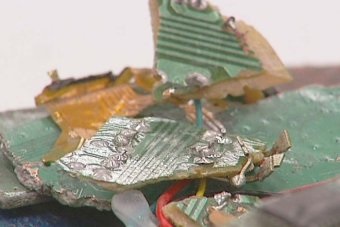 REPORT
/ INTERNATIONAL NEWS REPORT
/ INTERNATIONAL NEWS
|
|
Next Article
Researchers worried precious metals lost in e-waste recycling
Toxics Link
Source: ABC News, Date: , 2013
Researchers
worried precious metals lost in e-waste recycling

Gold, copper, platinum and palladium are all
precious metals Australians are throwing away by sending old televisions,
telephones and computers overseas.
Researchers at the University of South Australia are exploring ways to
reclaim those materials and have turned to the mining industry for the
know-how.
As technology changes, old TVs are sometimes dumped once they reach
their use-by date.
But Dr JC Tan of UniSA said it was perhaps less evident what happened to
whitegoods and other electronic devices when they were sent to recycling
depots.
"Currently in Australia there's no one doing 100 per cent recycling,"
he said.
He said scientists at the university were developing what they called
'urban mining'.
"[It is] a process of reclaiming resources from all this electronic
waste. We are talking about the reuse and [increasing] the recycling value of
this e-waste," he said.
Costly loss of resources
Most electronic waste is collected at depots and sent off to be shredded
and shipped to China for processing.
It means Australia is losing out on precious metals, for example one
tonne of old mobile phones can contain well over 100 kilograms of copper, three
kilograms of silver and 200 grams of gold.
Researcher Dr Max Zanin said it was a costly loss.
"The unique thing is that in this waste material [the]
concentration of these metals is relatively high, it's much higher than the
normal concentration you have in real ore," he said.
UniSA's urban mining project plans to grind the valuable e-waste into a
powder.
The concentrate could then be put into flotation plants similar to those
used at the Olympic Dam outback mine in South Australia, to separate minerals.
By pumping in air to form bubbles, the precious metals can then be
scooped off the top.
The process known as froth flotation is common in the mining industry.
Researcher Professor Thomas Nann said it could lead to a new niche
recycling industry.
"This is a clear goal we want to achieve, to start new businesses,
help the environment and in general help South Australia and Australia,"
he said.
The UniSA team said it hoped its project would lead to a new way of
thinking about recycling.
Next Article
|
|


